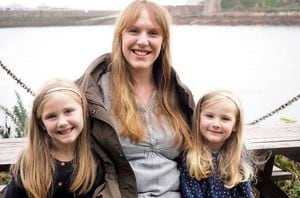Home is where the school is
Jo Le Page talks to local mum Jessica Girard to find out more about home education in Guernsey and how it works for her family...

MOST of us are familiar with the term ‘home-schooling’, or ‘home education’ as it is more commonly called in the UK, but how much do we really know about it?
Perhaps you are incredulous at the mere thought of it, or find it difficult to understand how it can even work in practice.
Whatever our personal opinions on whether a child should or should not be home educated, whether we agree with it in some situations and not in others, whether we wholeheartedly support it, or just have questions on the subject, this Q&A with local mum Jessica Girard is a unique opportunity to open the door and walk into the home of a family who are home educating, to sit with them and learn how and why they are on this journey.
I am grateful to Jessica and her family for being so open and willing to share their story. Of course, theirs is just one example of what works for one family, and different home-educating families use different methods, but it does offer a wonderful snapshot of how home education can work in our beautiful island of Guernsey.
Before you had children, what was your earliest memory of becoming aware of home educating and what was your initial understanding of it?
My first experience of home educating was during a trip to Malawi many years before I had my daughters. My husband and I met a British family who just so happened to be home educating and I was simply blown away by their kids and the lifestyle they pursued as a family. Until this point I had never really given much thought to educational options for our future children – home-schooling had just been something I vaguely knew was popular in America, but now my eyes had been opened and I liked what I saw.
At what stage did you begin to consider the idea of home educating for your family?
We started to consider home education for our children before we even had children. I’ve always found child development, and early years education in particular, an interesting topic and once home education was on my radar I started to research the various educational philosophies – Waldorf, Montessori, Classical, Charlotte Mason, etc. – this helped me to consider all our educational options and piece together a picture of the sort of education I wanted for my children. Home educating quickly became our preference.
What is your reason for home educating?
Our reason for home educating our girls is quite simply lifestyle choice. It allows us more time together as a family and greater freedom and flexibility when it comes to learning and we love that. Our girls get to learn at their own pace and we get to prioritise our own values and interests.
What is a typical home-school day like in your house?
For us the day starts with chores straight after breakfast – even my four-year-old gets involved – and once the house is in order we move on to ‘Table Time’ work for my six-year-old, which involves some reading and writing practice, as well as some maths, whilst my four-year-old busies herself with fine motor activities and puzzles. This usually takes about 15 minutes and then we get comfy on the sofa for our morning book basket, which includes a whole variety of subjects from poetry and art to history, geography and PSHE. There are always a lot of short play breaks thrown in throughout the morning and then ‘school’ work in the formal sense is usually finished by lunch, meaning we’re then free in the afternoons to attend groups, go on play dates, pursue hobbies and work on crafts.

In your experience what are some of the reasons why people home educate their children?
People come to home educating for many different reasons. There are, of course, some who turn to home educating because the school system has not worked for their child but more and more families across Britain, including here in Guernsey, are choosing home educating as their educational preference right from the start.
I think families today are just much more aware of their options and if they feel the school system isn’t what they want for their child then they’re not afraid to look at the alternatives.
What are common myths about home educating?
The number one question I get asked tends to be around socialisation. There seems to be the assumption that children who learn at home will turn out to be weird and unsociable when the truth is many school-going kids will turn out to be weird and unsociable too – that’s much more dependent on personality than it is on education. The reality is there are plenty of opportunities on-island for home-educating families to learn in community together and to access various social groups. In my experience my girls are attending groups and play dates with friends and family every day of the week – socialising is definitely not an issue, trying to fit all the social activities into our schedule is.
Many people also seem to assume that if you home-educate your children then you hate schools and think all children should be educated at home. The truth is far from it. Yes, there will be some families who have had negative experiences of school but as home educators we are very much aware that there are options when it comes to education and, just as with all aspects of parenting, you have to choose what works for your children and your family and for some this will, of course, be a school.
What is the home-educating community like in Guernsey?
There are several families home-educating on the island these days and after two years of home educating I’ve still not met them all, but we do meet regularly with other families with primary-school-aged children for a nature explorers group and it’s a lovely community to be a part of. My girls have built some of their closest friendships here.
There are also sailing groups, climbing groups and for the high school students there are groups working towards their Duke of Edinburgh’s award and studying towards GCSEs. There are many opportunities for group learning and skill sharing amongst the home ed community and people can be as involved in this as they want to be.
What would you say to people who say they don’t feel qualified to home educate their children?
Home educating is an additional responsibility to take on as a parent so it’s understandable for parents to have doubts, but it’s important to point out that no qualification or specific skill set is required to be a home educator.
Here in Guernsey we have great freedom in how we home educate our children, there is no specific curriculum you have to follow, no set days that you have to do ‘school’ and you can do what works for you and your children.
For those unsure about where to start when considering home education, I always suggest they spend time thinking about why they want to home educate before they start working out the ‘how-to’ of home educating. This may sound simple, but if you get bogged down in setting schedules and buying curriculum before you even really know what sort of education you want to offer your children, then you can end up wasting a lot of time and money. The ‘why’ should always inform the ‘how’ and researching educational philosophies to pinpoint the educational methods and values that inspire you can help with this. It will enable you to make informed choices about how you then deliver the education you want for your child.
How would someone go about home educating their child in Guernsey?
If you want to home educate your child then your first port of call is the Education department. You will need to inform them of your intention to home educate and they will then arrange to visit with you to discuss some of your plans. If your child is already in school then there are some additional conversations to have with the school before you can withdraw your child, but generally it’s all very straightforward.
What would you like people to know about home educating and what would you like people to take away from this article today?
I would like for parents to be aware that they do have options when it comes to educating their children and for the public in general to start to view home educating in a more positive light because it is a wonderfully enriching educational experience for many children.
Will you have to send your children to school at some point? (i.e. for GCSEs)
Some families choose to enter their children into school at some point during high school so they can study towards exams but you are not required to do so. It is possible for children to be home educated right through high school and it all very much comes down to personal choice and family circumstances. Right now I’d like to home educate my girls for as long as I can and if I can guide them through their GCSE years from home then I will be delighted to do so, but that is still a long way off for us and I’m aware that you can never say never. I am however encouraged to see teenagers in the home ed community on-island who are currently studying towards their GCSE/iGCSE qualifications. Most will sit these exams as external candidates in the local schools, whilst some are accessing GCSE courses through adult education at the College of FE.
Can home educating in the early years adequately prepare children for a transition into school and the exam years?
Home-educated children are often incredibly independent, adaptable and resourceful kids, used to learning in a variety of settings and in a variety of ways so when life transitions come their way, such as transitioning into the school system, taking exams or moving on to university, they tend to flourish.
Do you find home educating on such a small island to be restrictive?
Not at all. Guernsey may be small but it has a lot to offer. For families like us who enjoy learning outdoors amongst nature it’s the perfect place to be as it has so many beaches and parks to choose from and all within a 15-minute drive. It also has some great heritage sites and exhibitions throughout the year so a Discovery Pass (from Guernsey Museums) is a must. In the past week alone we’ve visited the Discovery Room at Guernsey Museums in Candie Gardens and been on a history field trip to the Dehus Dolmen, with five more field trips planned for later this term. There are also many sports, arts and social groups on the island and home-educated children are accessing everything from swimming and dance lessons to Scouts and Girlguiding, theatre groups, football clubs, choirs and music lessons, the list goes on and you need only be limited by your budget. The Schools Library Service and Guille-Alles Library are also great resources.
It’s worth pointing out though that there is no financial support for home-educated children, which may restrict some families. Despite taking pressure off the school system by home educating and effectively saving the States of Guernsey a lot of money, there are no subsidies given to home educators to help with buying books or providing music lessons for the children. The full costs are on you as the parents, which is important to know when choosing to home educate.
For more information about home education in Guernsey, visit www.gov.gg/homeeducation.
You can follow Jessica’s home education journey at www.theopenhome.org.





